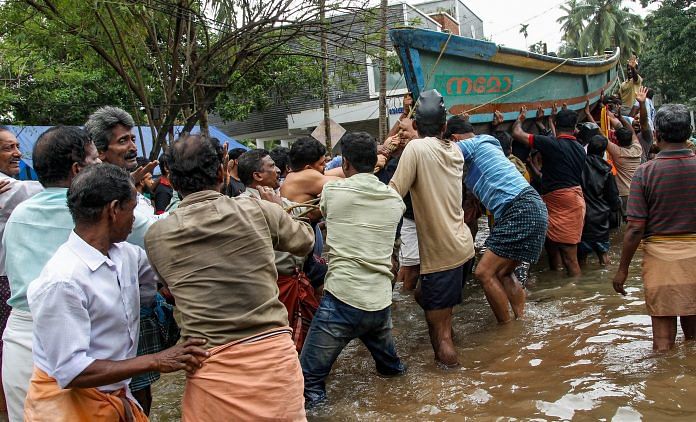Kerala floods won’t be the last disaster that hits us. Maybe, it will be the one that makes us pause and ask what we deserve.
A massive natural disaster like the Kerala floods tests everybody. It also tends to bring out the best and the worst of human behaviour among our politicians, bureaucrats and journalists.
It also makes you realise that politicians often forget that they have to serve the people who elect them.
From the viral video clip of Karnataka minister H.D. Revanna throwing biscuit packets at people in a relief camp to Donald Trump throwing toilet paper rolls at a crowd in Puerto Rico to the Centre’s lackadaisical response to the Kerala floods, the stark reality of how our politicians react to tragedies has been exposed. The mere presence of politicians in disaster-hit areas is taken to be a sign of their involvement with the relief efforts.
Often, this misfires.
Also read: Kerala has raised the bar, shamed the Indian conscience on disaster relief
Aerial surveys are photo-ops; the presence of high-security leaders can hamper relief work and distract officials.
This is not to say that some politicians don’t do incredible, important work when it comes to disasters. Kerala chief minister Pinarayi Vijayan’s immense grace when under fire, and his measured and calm updates during the floods went a long way in quelling the hysteria that would have been whipped up in any other state.
Vijayan, however, shone out with his work because he’s an anomaly. Most politicians entering disaster zones end up creating hindrances for on-ground workers because they come like saviours, and not as ablers of local bureaucratic machinery.
Why do they continue doing so? The answer may lie in the very concept of disaster preparedness and our understanding of what constitutes ‘good work’. Despite the existence of the National Disaster Response Force (NDRF) and the disaster management guidelines developed to strengthen the Disaster Management Act of 2005, the idea of disaster management works in the background of our consciousness. It’s portrayed as an inconvenience, and as the state’s duty. There is nothing exciting or newsbyte-worthy in people trying to create anti-flooding mechanisms.
Relief and response, on the other hand, are sellable. They come attached with drama, high-octane emotions, and incredible stories. Politicians hope to harness these emotions and turn them into a powerful narrative about how they reach out to people. It would work (and it does work) when this is done with empathy, care, and wise public relations management. The moment politicians try to exploit a tragedy with no context or perspective, they falter – and with the advent of social media, people are not ready to forgive easily.
Due to the advent of user-led media, people now have access to incredible on-ground reporting, which helps them put politicians and their behaviour in the larger context. That’s why what could have earlier passed off as ‘help’ by the media in building a positive narrative is now ripped apart as peddling of tragedy by people in positions of power.
Also read: Behind official Kerala rescue website are 1,500 techies working for free
On the face of it, not much can be done about this unhealthy nexus of politicians, media, and justifiers. The kind of reach and impact media in India has, especially on perception building, is hard to comprehend, let alone combat. It has to start with us, though. This is a spiel that has been repeated often, but it has to be reiterated. We need to demand better from the media. We need to call out bad media. We need to support independent reporting and community led media (by the way, have you sent in some support for India’s first community led radio, run majorly by Dalit women?).
People are tired of being let down by their elected representatives, by their media, by every single avenue of succour and hope we deserve. I definitely know I am. Stories of human kindness that emerge from a tragedy give us something to have faith in, but this belies a basic truth – we shouldn’t have to depend on the unsteady bearing of altruism to expect a basic access to security and dignity.
Our politicians need to take a step back and ask themselves what and who they want to serve – us, their people, or their own interests. A country as wide and fraught as ours has hobbled along for the past 70-odd years despite political incompetence. I don’t know how long this will continue. I don’t know if it should, if at all.
Kerala floods will not be the last disaster that hits us. Maybe, it will be the one that makes us pause and ask what we deserve in times of disaster. Maybe, it will be the one occasion that shows us that we deserve far more than what we are afforded.
The author is a poet.




Objective, unbiased, thought provoking.